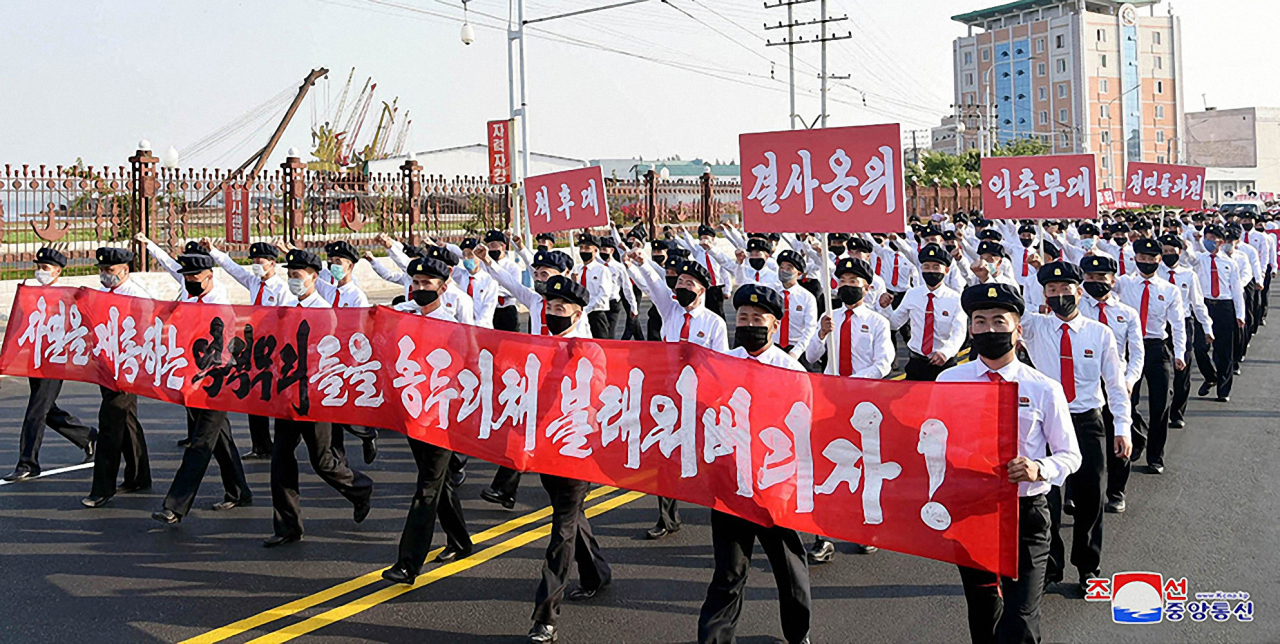 |
A photo released by Korean Central News Agency shows North Korean students marching in protest of anti-North Korean leaflets. (KCNA-Yonhap) |
North Korea on Tuesday cut all communication channels including the hotline between Cheong Wa Dae and its leadership, prompting concerns for tensions escalating between the two Koreas.
The decision was announced by the North’s state-run Korean Central News Agency, which also announced that all projects concerning South Korea will now become “projects against the enemy.”
“From 12 noon June 9, the communication line between the North and South’s governments maintained through the joint liaison office, the West Sea communication line between the militaries, North-South test communication line, the direct communication line between the office of the Central Committee of the Workers’ Party and Cheong Wa Dae will be completely shut down and terminated,” the KCNA said, saying that move was ordered by Kim Yo-jong and Kim Yong-chol at a meeting of departments concerned with South Korea held Monday.
Kim Yo-jong is sister of North Korean leader Kim Jong-un and first vice department director of the Central Committee of the Workers’ Party. Kim Yong-chol is a vice chairman of the central committee, who heads South Korea-related projects.
The hotline between the two Koreas’ top offices were set up in April 2018, but there have been no confirmed use of the line since it was tested on April 20. The military and government communication channels have been used twice daily since they were set up, but the North did not respond to any communications on Tuesday, according to South Korean officials.
The move comes days after Kim Yo-jong’s warning that Seoul must prepare for severe consequences including the inter-Korean military agreement signed on Sept. 19, 2018, being scrapped if Seoul does not stop anti-North Korean leaflets landing on its territory.
Tuesdays’ KCNA report went onto reveal that Kim also reviewed measures that will be taken against the South at the meeting.
“The need to thoroughly change South-related projects into projects against the enemy was stressed, and plans were reviewed to accurately exact the price of the wrongs committed by the betrayers and the trash,” the report said, referring to the South as betrayers and trash.
The KCNA said that Pyongyang has concluded that there is no more need to meet with the South, nor any issues the two sides need to discuss, and that severing the communication channels is the “first step in removing unnecessary things.”
Seoul’s Unification Ministry declined to elaborate on possible steps Seoul may take and its assessment of the North’s motivations, saying only that the government will monitor the situation and that it considers communications to be vital to inter-Korean relations.
A similar stance was taken by the Ministry of National Defense, saying that it would closely monitor the developments and respond accordingly.
This is the seventh time the North has severed communications with the South. The first came after the 1976 murder of two US Army officers by North Korean soldiers at Panmunjom, and the most recent took place in February 2016, after the South shut down Kaesong industrial park after the North’s long range missile launch.
The longest period inter-Korean communications were shut down was between September 1980 and September 1984.
By Choi He-suk (
cheesuk@heraldcorp.com)








![[Today’s K-pop] Blackpink’s Jennie, Lisa invited to Coachella as solo acts](http://res.heraldm.com/phpwas/restmb_idxmake.php?idx=644&simg=/content/image/2024/11/21/20241121050099_0.jpg)